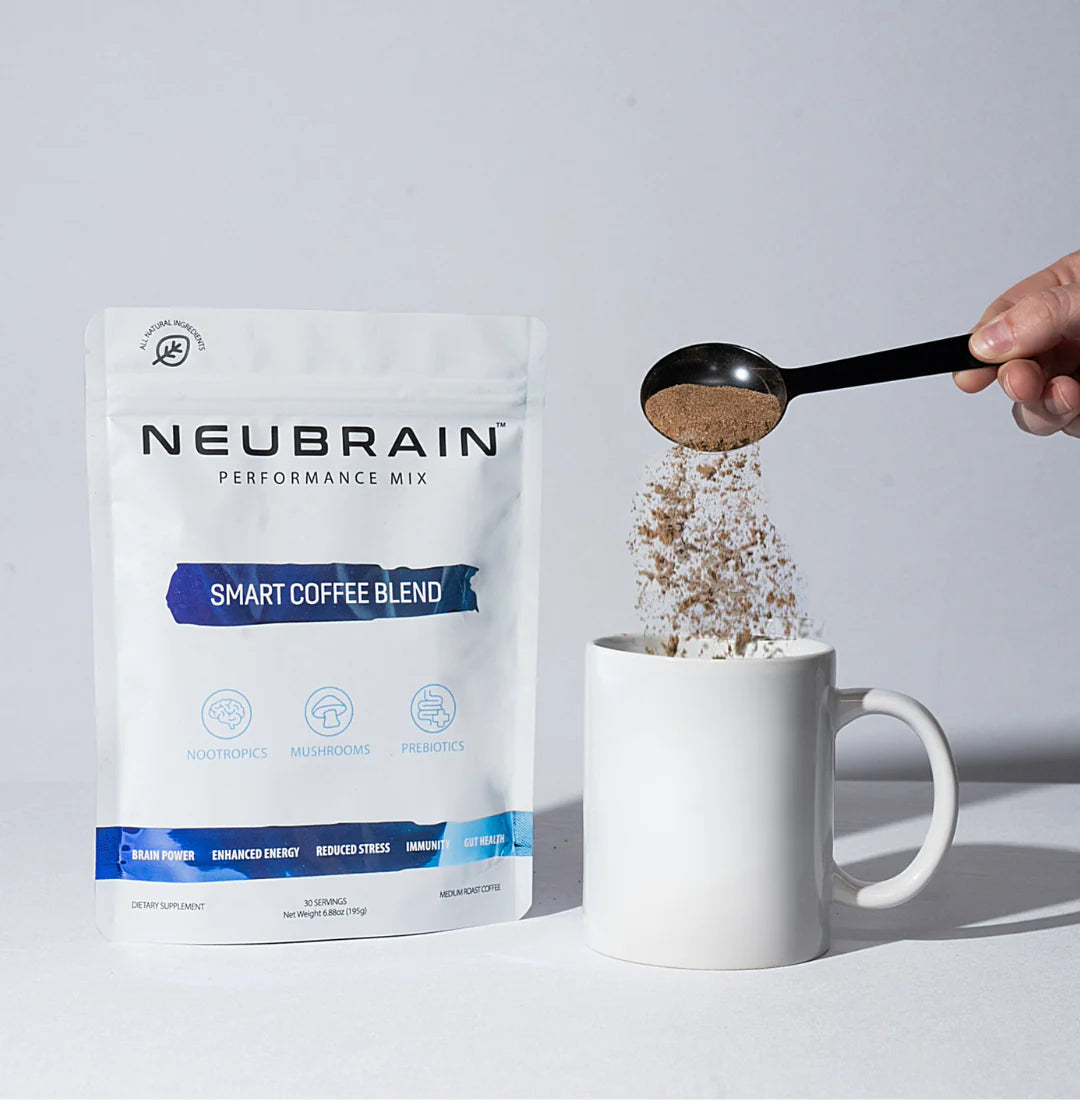Prebiotics vs. Probiotics: Which One Does Your Brain Need?
In recent years, more and more research has shown that your gut health plays a direct role in how your brain functions. Whether it’s managing stress, improving focus, or boosting mood, your microbiome—the trillions of bacteria and organisms in your gut—is deeply linked to your mental performance.
This connection is known as the gut-brain axis—a two-way communication pathway between your digestive system and your central nervous system. And when it comes to optimizing this axis, the terms prebiotics and probiotics come up a lot. But what exactly do they do—and which one is more important for your brain?
Let’s dive into the science.
What Are Probiotics?
Probiotics are live beneficial bacteria found in fermented foods or supplements. These are the organisms that populate your gut and support digestion, immune health, and even emotional regulation. Common probiotic-rich foods include:
-Yogurt
-Kefir
-Sauerkraut
-Kimchi
-Miso
-Certain cheeses
When taken regularly, probiotics help maintain a healthy gut microbiome. This matters because a diverse and balanced gut ecosystem helps reduce systemic inflammation—one of the root causes of cognitive decline and brain fog.
The Science: The NIH states that probiotics may play a key role in reducing symptoms of anxiety and depression by modulating gut bacteria that influence the production of neurotransmitters like serotonin.
Source: National Center for Complementary and Integrative Health
What Are Prebiotics?
Prebiotics are non-digestible fibers that act as food for probiotics. In other words, while probiotics are the beneficial bacteria, prebiotics are the nutrients that keep them alive and thriving.
Common prebiotic foods include:
-Chicory root
-Garlic
-Onions
-Bananas
-Asparagus
-Oats
-Apples
Prebiotics fuel the growth of good bacteria in the gut and promote the production of short-chain fatty acids (SCFAs) like butyrate, which has been shown to strengthen the gut lining, reduce inflammation, and influence brain health.
The Science: According to a study published on PubMed, prebiotic supplementation improved emotional processing and lowered cortisol levels, indicating its impact on stress resilience.
Prebiotics vs. Probiotics: Which One Does Your Brain Need More?
The answer may surprise you: while both are important, prebiotics might be more critical for brain health.
Here’s why:
-Probiotics are delicate and often destroyed by stomach acid or poorly absorbed.
-Prebiotics, on the other hand, are stable fibers that reliably reach the colon and stimulate the growth of existing good bacteria.
-Prebiotics lead to consistent production of SCFAs that benefit brain function, memory, and stress modulation.
A 2015 study from the National Institutes of Health demonstrated that prebiotics can have measurable effects on cortisol awakening response and emotional bias, which are strong markers of brain function.
The Gut-Brain Axis: The Missing Link
Your gut produces over 90% of your body’s serotonin, a neurotransmitter crucial for mood regulation and focus. When the gut is imbalanced, inflammation and dysbiosis occur, reducing the availability of serotonin and other key chemicals like dopamine and GABA.
Supporting gut health with the right prebiotics and probiotics keeps your microbiome balanced, inflammation low, and neurotransmitter production optimal.
How Neubrain Supports Brain Function Through the Gut
Neubrain isn’t just a smart coffee—it’s a holistic cognitive support system that prioritizes both brain and gut wellness.
-Turkey Tail and Chaga mushrooms in Neubrain contain prebiotic beta-glucans that fuel the growth of healthy gut bacteria.
-Reishi is known to balance cortisol levels and support gut barrier integrity.
-CognatiQ® and L-Theanine promote stress reduction and calm focus, working in harmony with gut-brain signaling.
-Collagen in Neubrain helps repair the gut lining and improve digestion, which further enhances nutrient absorption and brain performance.
The synergy of these ingredients helps optimize the gut-brain axis without the jittery, crash-prone side effects of conventional stimulants.
Cognitive Benefits of Prebiotics
Prebiotics are particularly important for brain health because they stimulate the production of short-chain fatty acids (SCFAs), such as butyrate. SCFAs are known to reduce inflammation, protect the blood-brain barrier, and improve memory.
In one randomized controlled trial, participants who consumed prebiotic fiber experienced lower cortisol levels (the stress hormone) and reported higher alertness and better emotional processing.
The Role of Functional Mushrooms in Gut-Brain Health
Neubrain’s formula includes powerful mushrooms like Turkey Tail, Chaga, and Reishi—all of which have been shown to positively impact the gut microbiome.
-Turkey Tail: Rich in polysaccharopeptides that feed beneficial gut bacteria
-Reishi: Balances the immune system and supports stress resilience
-Chaga: A natural antioxidant powerhouse that reduces gut inflammation
These mushrooms act similarly to prebiotics by supporting the proliferation of beneficial bacteria and regulating gut flora.
NIH Study on Functional Mushrooms
Neurological Impact of Probiotic Supplementation
While probiotics are well-known for digestive support, certain strains have been linked to reduced anxiety and improved cognition.
A clinical study published in Frontiers in Aging Neuroscience found that multi-strain probiotic supplementation improved cognition in adults with mild memory decline.
Study on Probiotics & Cognition
Should You Take Both?
Experts often recommend pairing prebiotics and probiotics together—known as a synbiotic effect. Prebiotics feed probiotics, enhancing their survival and effectiveness. Neubrain focuses primarily on prebiotic-rich adaptogens and gut-friendly mushrooms, making it a great foundation.
For those struggling with brain fog, mood swings, or poor digestion, combining Neubrain with a probiotic-rich diet may be the ideal solution.
Neubrain’s Gut-Brain Optimizing Ingredients
Neubrain goes beyond traditional mushroom coffee with ingredients tailored to both brain and gut:
-Lion’s Mane: Shown to stimulate Nerve Growth Factor (NGF), which supports brain plasticity.
-Cordyceps: Supports energy production at a cellular level.
-Alpha GPC and L-Theanine: Enhance focus while calming the nervous system.
-Collagen: May help maintain the integrity of the gut lining.
Together, these create a powerful nootropic and adaptogenic blend to support whole-body wellness.
Lifestyle Tips for a Healthy Gut-Brain Axis
Alongside Neubrain, here are some lifestyle practices to support both gut and brain health:
-Eat a fiber-rich diet with plenty of fruits and vegetables
-Get 7–8 hours of sleep per night
-Reduce sugar and processed food intake
-Incorporate fermented foods like yogurt, kefir, or miso
-Practice stress reduction techniques like breathwork or mindfulness
Final Thoughts
If you’re serious about improving your brain function naturally, don’t overlook your gut.
While probiotics offer immediate support, prebiotics may be the unsung hero that creates a long-lasting, resilient foundation for mental clarity, mood balance, and productivity.
When you sip Neubrain each morning, you’re doing more than energizing your body—you’re feeding your brain at the source.
Want to upgrade your mental clarity the natural way? Explore Neubrain’s prebiotic and nootropic blend and fuel your brain from the inside out.








